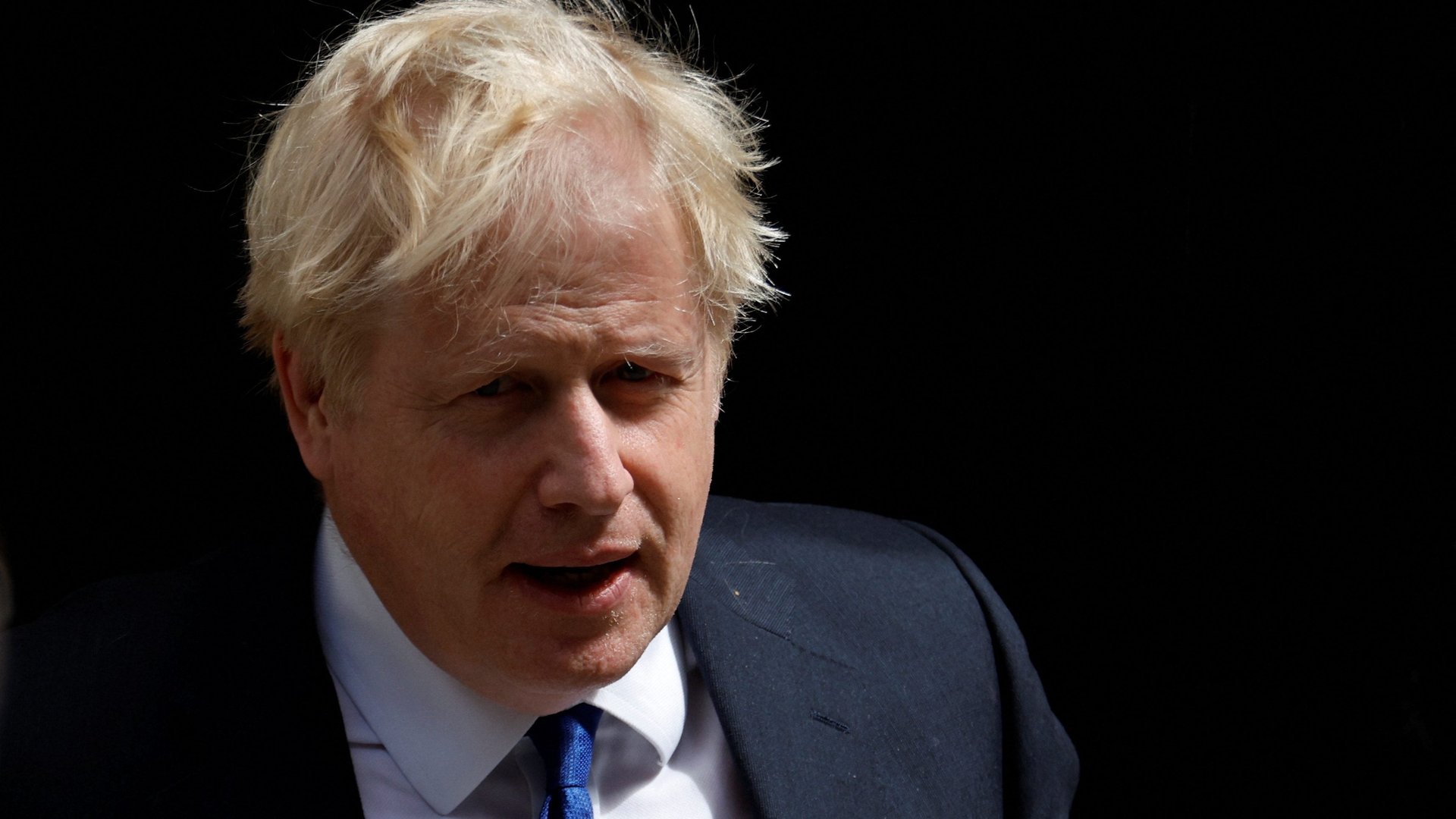UK prime minister Boris Johnson has resigned
Boris Johnson, the UK’s prime minister since 2019 and the spearhead of the 2016 Brexit campaign, resigned today.


Boris Johnson, the UK’s prime minister since 2019 and the spearhead of the 2016 Brexit campaign, resigned today.
Johnson’s resignation follows a huge revolt from his Conservative party, during which more than 50 lawmakers resigned in a 36-hour period starting on Tuesday night, when Rishi Sunak, the chancellor of the exchequer, and Sajid Javid, the health secretary, quit the government. Many of those resigning said they could no longer continue to serve under Johnson, and most called for him to step down.
In a speech outside 10 Downing Street today Johnson said he would stay on as prime minister until a new leader is selected.
Addressing the British people, Johnson said: “I want you to know how sad I am to be giving up the best job in the world; but them’s the breaks.”
Why Boris Johnson quit as prime minister
Scandal and controversy have dogged Johnson’s government and the man himself, particularly in the last months. In April, Johnson was fined for breaking his own laws, by attending and permitting several parties during the UK’s covid 19 lockdown. At least one party was at his official residence, 10 Downing Street.
In June, Johnson’s ethics advisor, Christopher Geidt, resigned, citing the prime minister’s willingness to break his own ministerial code. Later that month, the Conservatives lost two important by-elections by large margins, indicating that the party’s mandate was becoming less secure. Johnson argued to the last that his huge mandate—his December 2019 general election win with a landslide majority—meant he should continue even in the face of great internal opposition.
The final straw for many came at the end of June when Chris Pincher, the Conservative deputy chief whip, resigned after allegedly groping two guests at a private members’ club. Johnson initially denied having ever been told of any specific allegations against Pincher, but later admitted that he had been briefed on the issue in 2019.
Ministerial resignations and calls to leave
After Javid and Sunak’s back-to-back resignations, Johnson faced a slew of ministers leaving their jobs and distancing themselves from his leadership. Some ministers—unusually—called for him to resign while not resigning themselves.
These included lawmaker Michael Gove, also a key Brexiteer and a cabinet member, who called on Johnson to resign on Wednesday and was then summarily fired, and Priti Patel, the home secretary, who reportedly told Johnson to quit but remained in her post herself.
Today (July 7), Nadhim Zahawi, named by Johnson as the new chancellor just a day earlier, called for him to step down in a tweeted letter. Michelle Donelan, appointed as the new education secretary yesterday, resigned within 24 hours.
What happens next in the British government?
Reports suggested that Johnson will stay on as prime minister until the fall, to give the party time to elect a new leader. It will be up to the Conservative party, however, to decide on the process. Many Conservatives have expressed anger that Johnson chose to cling to power for so long rather than stepping aside when his support began to crumble.
If Johnson is forced to leave office immediately, though, his job will be filled temporarily by an interim prime minister. One likely candidate for this role is the deputy prime minister Dominic Raab, who fulfilled those duties when Johnson was in hospital with covid in 2020.
In choosing a new leader, the Conservatives may trigger a general election to seek a mandate for their candidate. But they may also elect a new party leader internally, and that person will become the next British prime minister.
There are many candidates for the top job: Penny Mordaunt, a former defence secretary; Sunak, Zahawi, Javid, and Gove; the defence secretary Ben Wallace; the foreign secretary Liz Truss, whose dealings with Russia and Ukraine have recently brought her to the fore; the hard Brexiteer Steve Baker; Jeremy Hunt, a former health secretary; and Suella Braverman, the attorney general, who said she would stand in any leadership election but didn’t herself resign.
Boris Johnson’s legacy
Johnson’s time in office has been marked by three huge events:
- Brexit: When Johnson took over from Theresa May in 2019, the UK was still embroiled in talks about leaving the EU, for which a majority of Britons voted in 2016. Johnson, who spent time on the fence before ultimately campaigning to leave, promised to “get Brexit done.” In a painful and protracted process, and at great economic cost, he did indeed shepherd the country out of the EU, although difficult questions surrounding the status of Northern Ireland remain unanswered.
- Covid: Johnson has been prime minister for the entirety of the pandemic so far. He ordered a national lockdown and also flouted it. Most notably, he oversaw a huge vaccine rollout, which saw the UK’s citizens vaccinated and boosted in large numbers more quickly than most international counterparts.
- Ukraine: Since Russia invaded Ukraine in February 2022, Johnson has been a vocal critic of the invasion and a supporter of Ukraine. This support has included sanctioning prominent Russians and the Russian economy, and providing £3.8 billion ($4.6 billion) in military support so far this year.